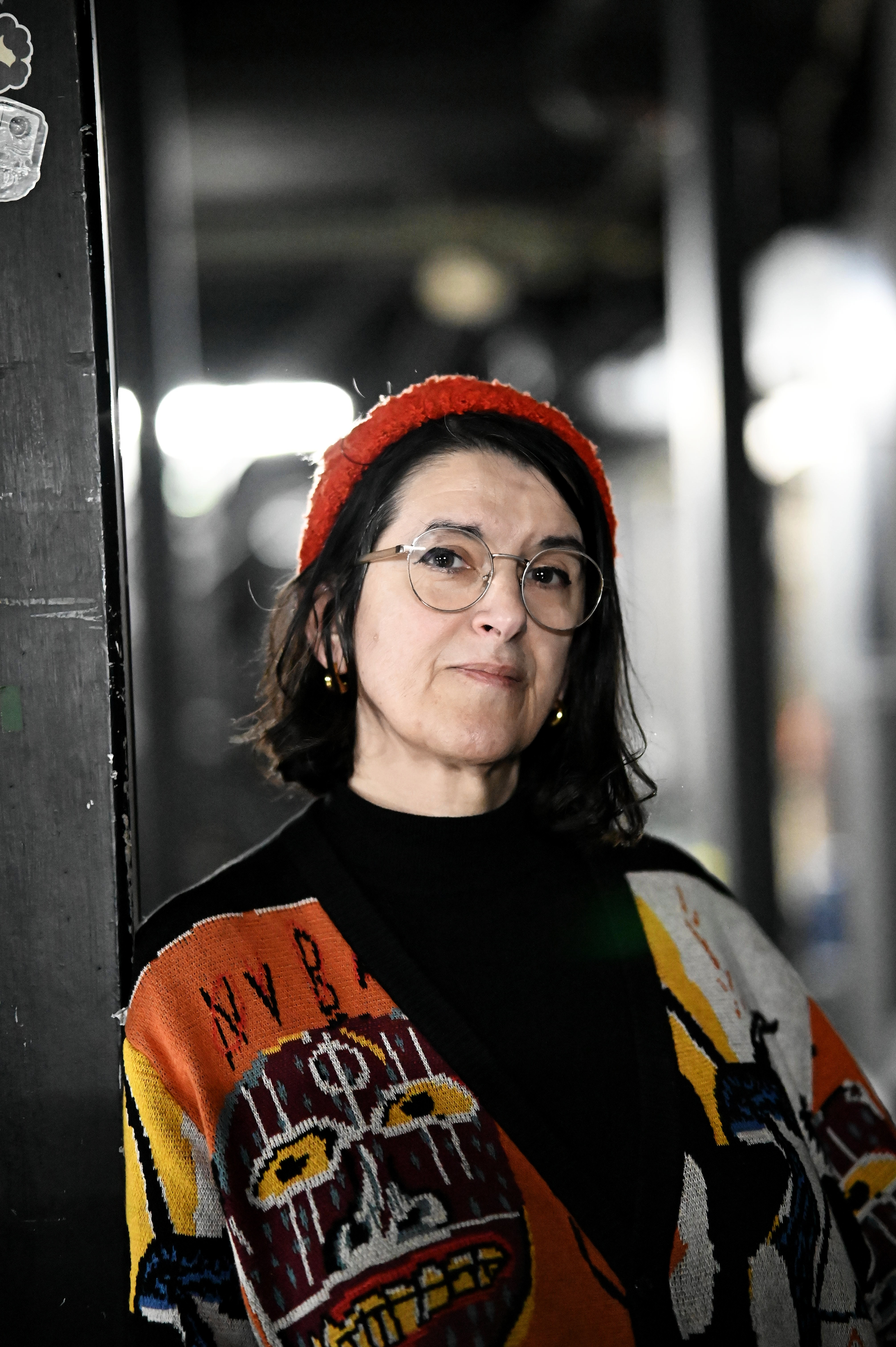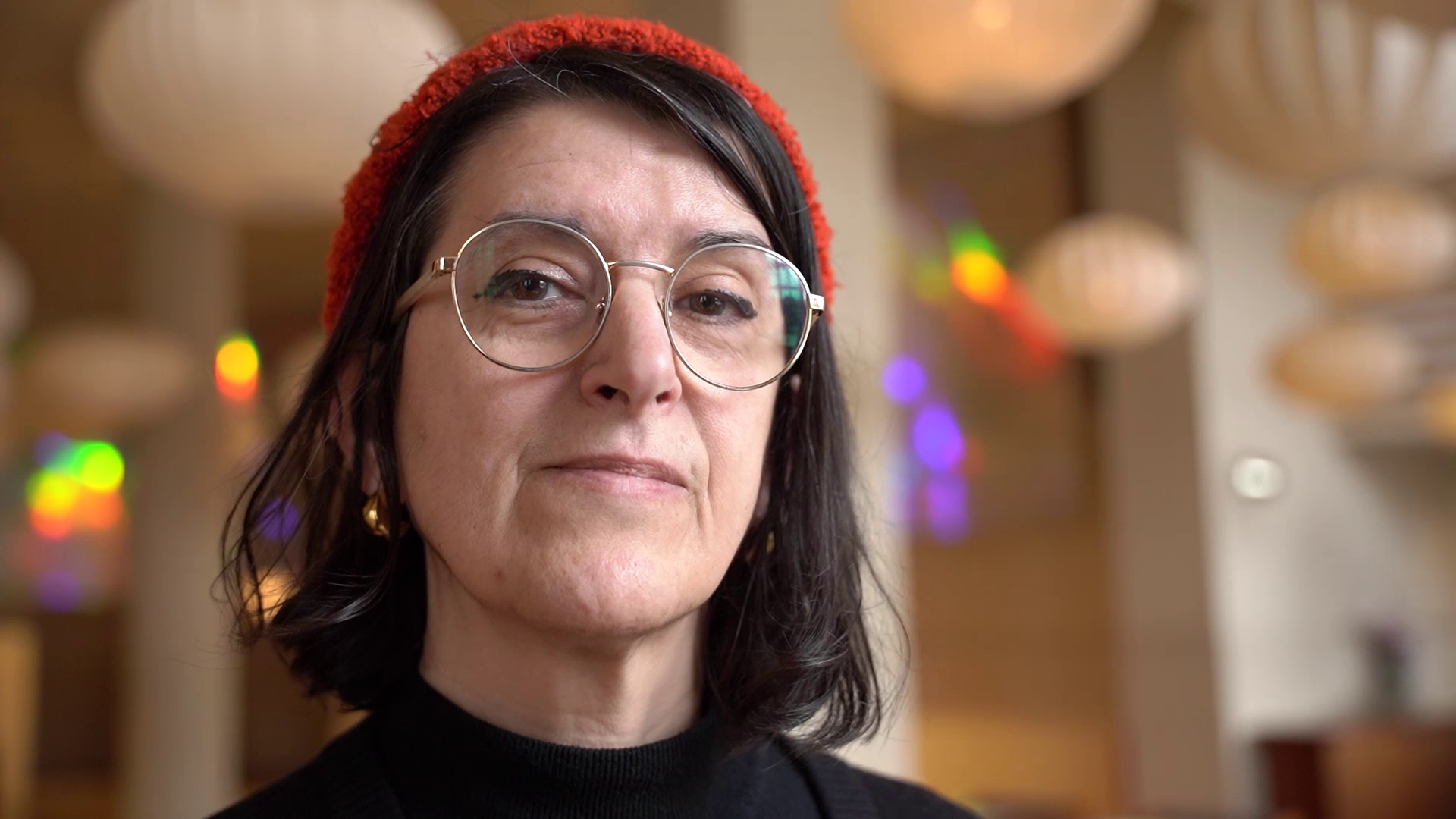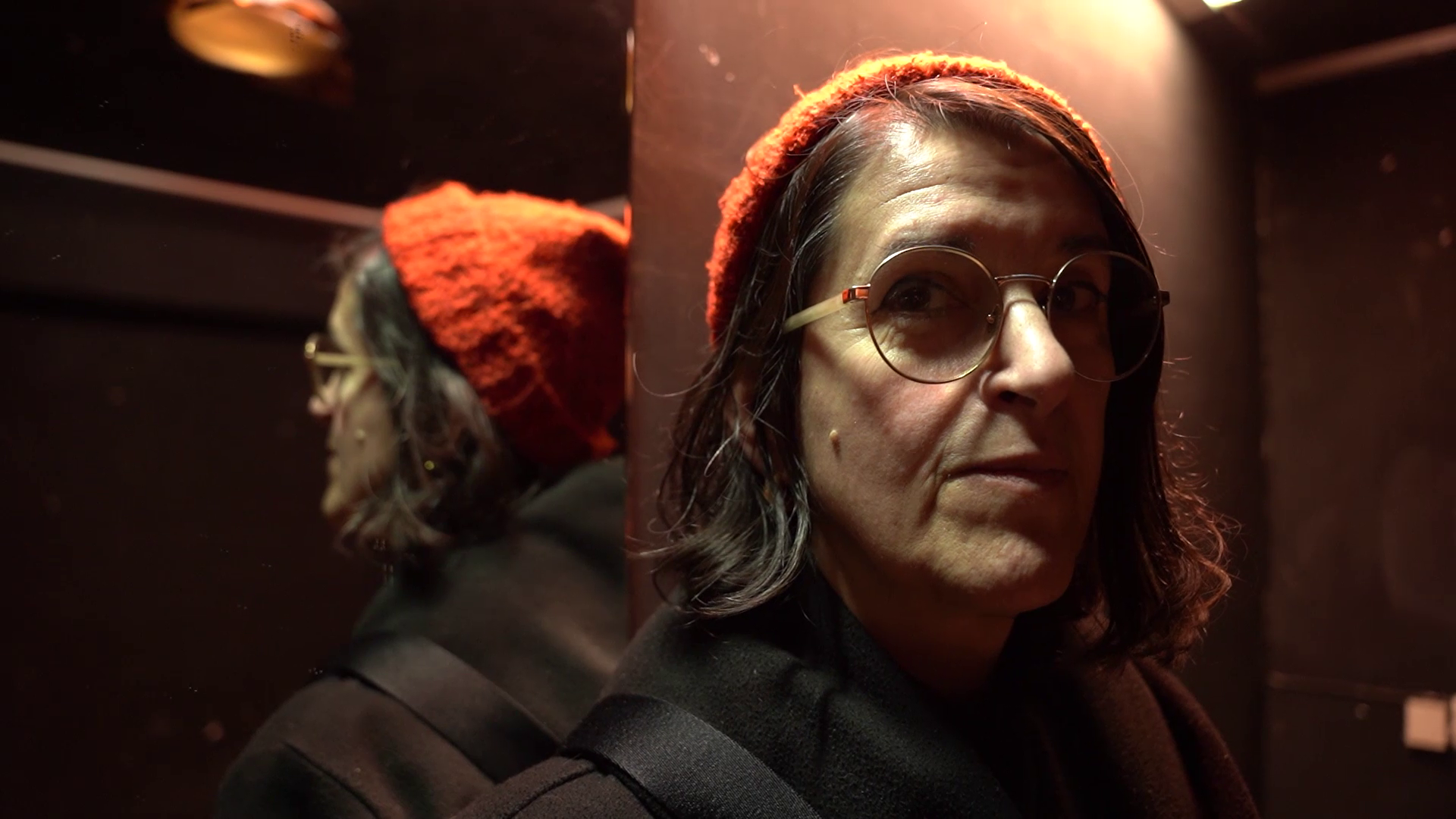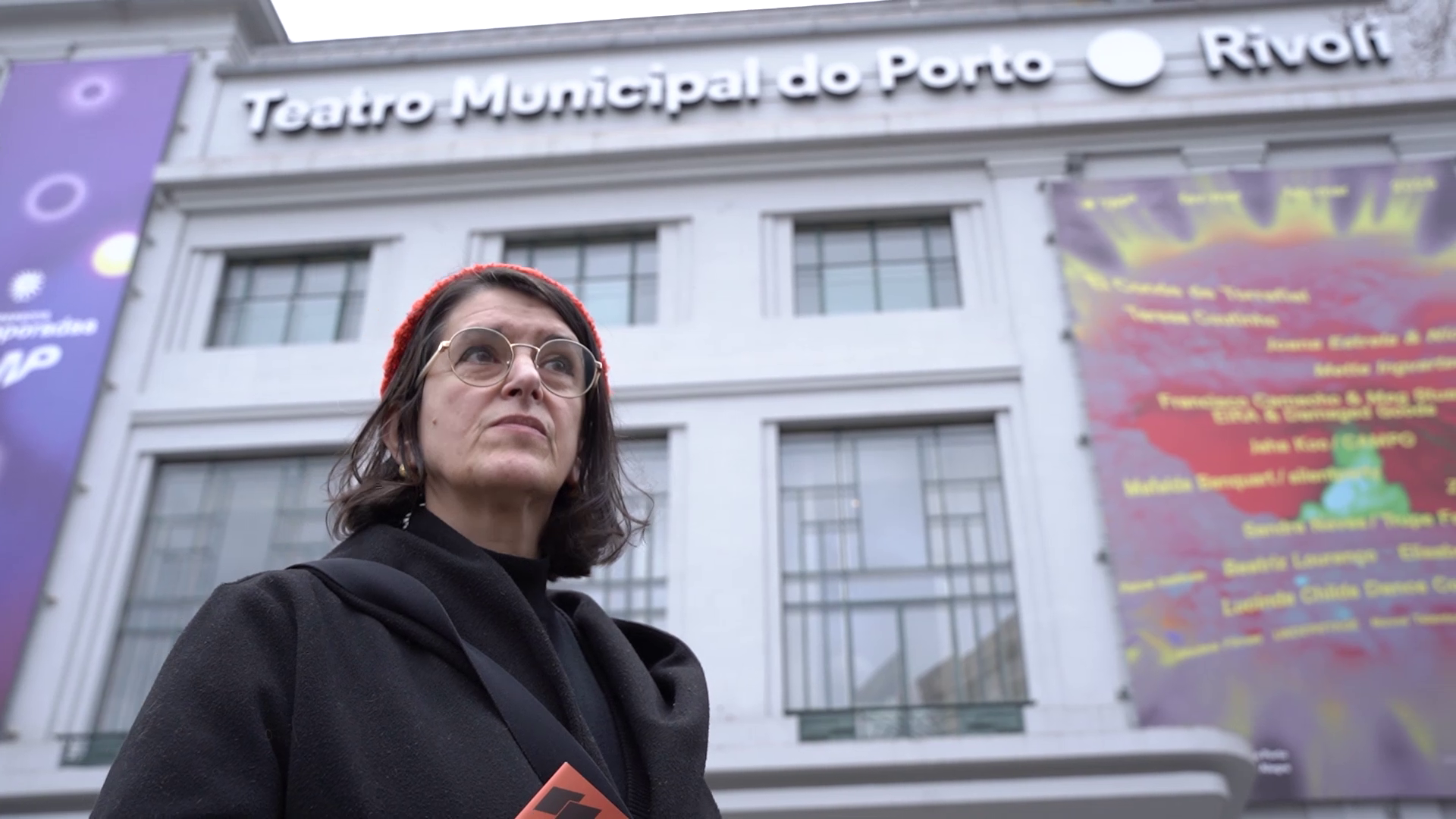EN

She is a unique voice in Portuguese music. Best known for having been the lead singer of Ban and for being one of the Três Tristes Tigres, Ana Deus has a prolific and diverse musical career, which includes collaborations and innovative projects, such as Osso Vaidoso, Bruta and Ruído Vário - just to name a few. Agenda Porto spoke to the artist who likes to link music, poetry and image, and who is about to release Arca, the new album by Três Tristes Tigres (TTT).
Born in Santarém in 1963, she moved to Porto in 1981 and since then has called the city home. ‘I'm already more from Porto than from Santarém. This is where I have my friends and where my family was born. But it was mainly here that I felt welcomed and diluted at the same time, because a small town like Santarém can be much crueler when you're a young teenager, [and where it was harder to find] people who looked like me, or had the same tastes as me,’ she admits. Ana considers that she ‘got lucky’ when she moved in the 1980s, because ‘things were starting to liven up’ in Porto. ‘It was easy to meet people, and I think I was quite lucky with the people I met.’
This was the case with João Loureiro, from Ban, who invited her to join the band after hearing her sing at Aniki Bobó. It was with Ban that she recorded her first album, Surrealizar, in 1988, which quickly became a hit. However, she admits that she didn't like ‘suddenly being recognised in the middle of the street’. ‘I didn't like it. And I, who had always liked to sing, I was naturally ‘cantaroleira’, started to become a little more shy, more afraid. So what catapulted me also held me back a little. I think it was a double-edged sword,’ she says.
In one of the songs on the album, ‘Ideal Social’, Ana sings ‘don't give me morals, give me an unreal advanced popular social ideal, surrealise around (...)’. We asked her what surrealising meant. ‘Freedom and creativity,’ she summarises. ‘There was a lot of hope - when you're young you have hope, and there were a lot of possibilities.’
But about her time at Ban, she comments: ‘Loureiro and I were a rather unlikely pairing - and I think that was exactly his idea. I was more connected to other types of music, rock and punk rock, both in terms of dress and practice. And it came together in a slightly strange way, but it worked out well because the disc was very well produced.’

Ana Deus © Rui Meireles
She went on to record two more albums with the band, but then came ‘her intention to record other things’, having had ‘great encouragement’ from her friend Regina Guimarães, a poet, playwright and lyricist, with whom, in the early 1990s, she founded the band whose name is a tongue twister: Três Tristes Tigres (‘it was a little mischief so people wouldn't forget; I think it was a good bet’, she laughs). ‘Regina was always telling me ‘I'll write you the lyrics, let's do songs', because I'd already started working with her on theatre projects."
Partes Sensíveis (1993), Guia Espiritual (1996) e Comum (1998) were the albums released by TTT in the last decade of the 20th century. After a 22-year hiatus, the trio, made up of Deus, Guimarães and Alexandre Soares, released Mínima Luz in 2020 and are now preparing to release their fifth album of originals, possibly in May. The disc, which was supposed to be called Atlas, has since changed its name and will be called Arca. ‘In a way, it talks a lot about migrations, both human and animal. The way things change. There have always been migrations. That's why I also talk about this eternal perspective. Migrants aren't a new thing; it's always been like this. And animals migrate too. The wind is everywhere. There are no barriers on the planet.’
“Ó vida que se semeia/ Todos nascemos migrantes” [‘O life that is sown/ We are all born migrants’] are verses from the first single, “Exodus”, released last year, which features singer-songwriter A Garota Não on vocals, and whose video clip was made by Deus.
Arca was a name that Ana Deus had already considered for other projects and which ‘ended up fitting like a glove’ on this disc, not only because of the themes, but also because of the cover, designed by artist Hilda Reis. ‘She makes collages and started making little paper boats so that we could somehow make up the cover. And I, who already had Arca [in my head], when I saw the paper boats, I thought it made perfect sense,’ she says.

© PIXBEE
Living slowly
In 2022, she was one of those female artists honoured in the exhibition ‘Women Who Make Noise’, organised by Casa Comum and the Institute of Sociology at the University of Porto. ‘Living Fast, Dying Late’ was the motto of the space that celebrated various women in Portuguese rock, including Ana Deus, who contradicts this maxim. ‘I live slowly; I like to live slowly. Today I came here and today I don't do anything else,’ she laughs. ‘It sounds arrogant to say that, but I'm trying not to do too much. And sometimes to do only what I feel like doing. I'm very interested in video now; I'm saying this here, but if I have time before making dinner, I'll still manipulate a few videos and get images and do this and that. So it's not as true as that, but I don't want to lead a hectic life, not at all.’
Deus, who chose passarinhar (dawdle, wander) as the motto for this conversation (we'll get to that in a minute!) says that she still likes the Porto scale, but that ‘because of my age’ she hardly goes out, ‘I don't bird so much any more’. ‘I'm more modest, I'm more at home... We start to measure our time differently, more slowly. I live slowly.’
And it is in her calm that she continues to be invited - and to accept - to collaborate with musicians from new generations, such as Glockenwise, who challenged her to take part in the song ‘Vida Vã’ (Vain Life). ‘That means I've come round, that I'm so old they think it's funny.’
Ana continues to reinvent herself as an artist and isn't afraid to experiment, to take risks, based on her personal tastes. ‘Most of the projects I have, that I've been doing, have come from my own initiative. I think about doing something, then I think about the musician who would be a good fit, who I'd like to work with.’ An example of this is the project Bruta (2015) with Nicolas Tricot, which combines music and poetry. Together they set to music poems by authors visited by madness.
‘It was a bit of a naive idea because at the time I was very interested in rough artists, but in painting and drawing. I like rough art, with that expression that doesn't need to be requested; you do it, it doesn't matter if anyone is watching. And it's also become a great source of business. People who were involved in institutions and started producing those super coherent works, because everything is very coherent; they're not really experimenting, they're expressing themselves,’ she explains.
It was then that she came across the book ‘Reino dos Bichos e dos Animais é o Meu Nome’ by Stela do Patrocínio, an illiterate Afro-Brazilian woman who had been in a mental institution, which inspired her to create Bruta. Based on this type of ‘sincere expression’, Ana carried out a research of Portuguese and foreign authors, but ‘ending up with writers who were considered mad, but who weren't illiterate, like Stela do Patrocínio’, she adds.

© PIXBEE
Passarinhar with Ana Deus
Ana takes us on a trip to Porto in the 80s and 90s and points out some of the places she used to go to with her eyes wide open, and of which she has fond memories, such as the Rivoli, where we recorded our interview (watch below). ‘I chose this place because it's part of my route as a spectator and as an artist. And I've seen this place in many ways; I've seen the Rivoli as a disco where there were parties. There was no audience; the floor was a wooden platform. It was like a discotheque after a certain hour, and I attended a fantastic Peter Murphy concert where the floor collapsed during the song Kick in the Eye,’ she recalls. ‘The floor opened up, swallowed some people, who weren't hurt too badly, and were lifted up onto the stage with the help of the musicians, and that's how a great memory was made, at least for me,’ he laughs. She also remembers a concert she saw there ‘by the fantastic Elza Soares, who was still very elegant’. ‘It was one of the most beautiful concerts I've ever seen,’ she says, also recalling some of the shows and events she took part in at Rivoli, including the Quintas de Leitura. ‘The Quintas de Leitura moved between the Campo Alegre Theatre and the Rivoli. In fact, I learnt a lot from the Quintas de Leitura, I learnt various ways of interpreting poems and various authors. I met a lot of new authors, new poets,’ she says.
The artist also describes her journey through the city from Escola Árvore, on Passeio das Virtudes. ‘That's where, in the 80s, I ended up meeting a lot of people connected to music, and I think that's what pushed me down this path, because people are more important than schools,’ she says. From Passeio das Virtudes, the artist tells us how she used to walk through the city: ‘the route went past the old Luso, then we went to Moinho de Vento, which was an inclusive bar, gay friendly - I mean, back then you didn't have to say that, that expression didn't exist; anyone was welcome, of course. And we'd end up in Foz and Boavista; we'd go round, sometimes we'd even pass by Foco when there was Loco Mosquito - this was in the 80s,’ she laughs.
Although she ‘wanders less’ nowadays, she likes to go to Culturgest ‘to see the exhibitions that are there’ and is a regular at the Almeida Garrett Municipal Library, where she picks up lots of books. ‘I usually see the exhibitions that are at the Municipal Gallery, and then I wander around, because [Jardim do Palácio de Cristal] have more and more white chickens,’ she says.
It was also because of the birds that Ana says she chose ‘wandering' (passarinhar) as the motto for this section. The artist argues that birds ‘have changed’ in the city. ‘When I lived in Santarém there were lots of animals; I pass an animal and look at it, I'm not indifferent, and it's normal to connect with animals, and I've noticed the number of exotic birds that also appear among the flocks of doves,’ she says. According to the artist, there are ‘various types of parrots, strange parakeets, and black and white squawks are starting to come... So, there are animals that are getting closer to the city, perhaps as a matter of survival. The city is attracting more and more people from all over in search of food, but also animals, particularly birds, which have changed a lot over time.’
Ana also argues that Porto should have dovecotes: 'I notice that doves have almost all their legs missing part of their fingers and many of them still have strings.... I can imagine doves trying to sleep in strange places, near wires and irons. They want to fly and they're trapped. And I wonder why there are no dovecotes. There's a dovecote, as far as I know, in Serralves, which is very beautiful, and I think there should be more dovecotes in the city, so the doves don't go shitting on the buildings, don't you? At the same time, they could control the population. It's a bit like homelessness. You have to find places for people.’

© PIXBEE
Share
FB
X
WA
LINK
Relacionados


